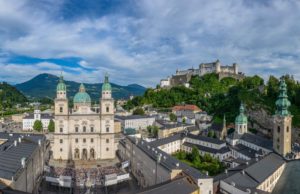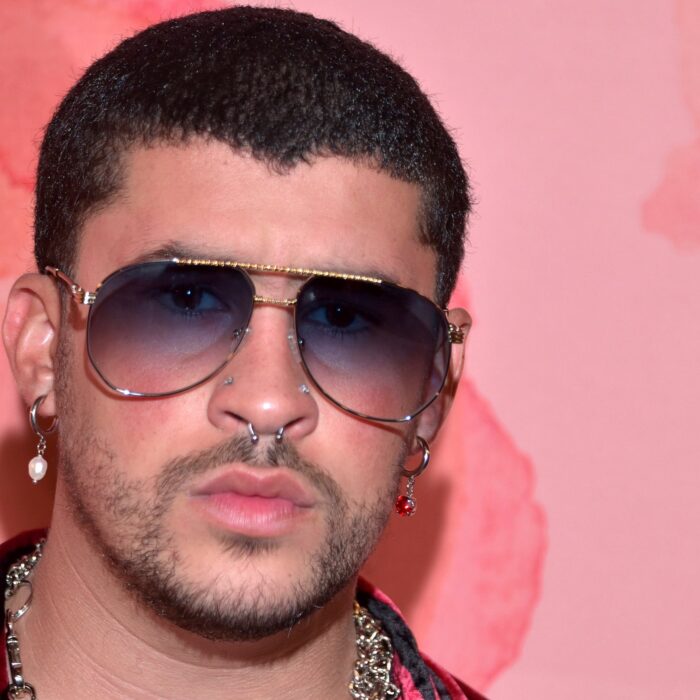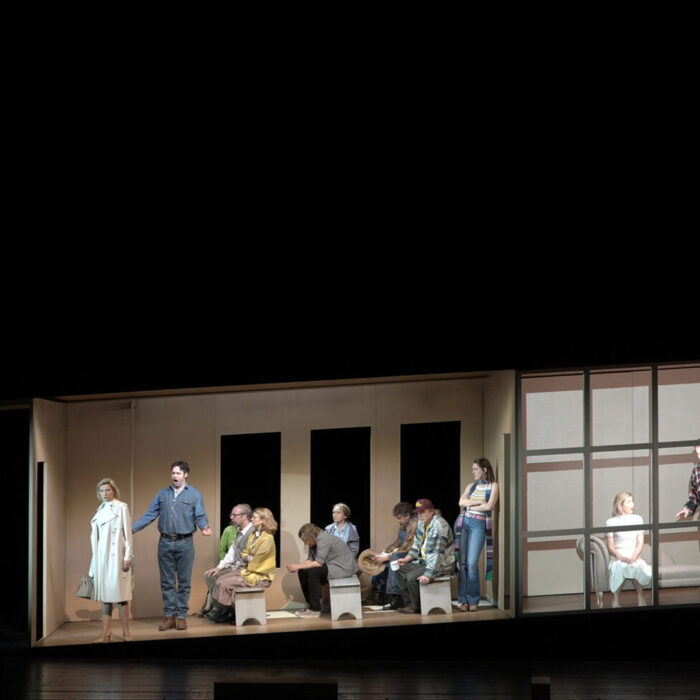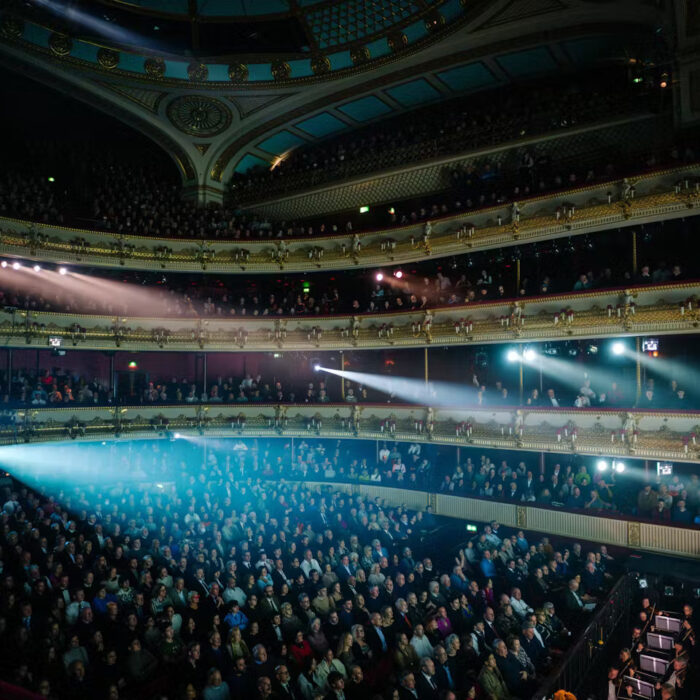
The Pandemic Prevention Plan That Enabled the Salzburg Festival’s 100th Edition to Take Place
By Ona JarmalavičiūtėEvery year, the Salzburg Festival fascinates with its superhuman efforts to nurture the prosperous cultural life of the city. During the summer they organize and present to the public the full seasonal repertoire of the opera house, drama theater, and concert hall.
This year, with the onset of the coronavirus pandemic and the collapse of almost the entire world’s cultural sector, even more effort has had to be made in order to move forward. The centenary of the festival in 2020 was anticipated for more than a year, and a huge impressive program for it was put together last season.
During its 44 days, 222 events were scheduled to be performed on 15 stages, dozens of which were new opera productions – “Elektra,” “Don Juan,” “The Magic Flute,” “Boris Godunov,” “Tosca,” “Don Pasquale,” “The Messiah,” “Intolleranza 1960,” “The Sicilian Mixers,” and “Neither.”
The ground slipped from underfoot in the wake of a pandemic. To the disapproval of some and the joy of others, the organizers of the festival were in no hurry to cancel the event and instead watched the scene unfold across the globe. big summer festivals unfolded. As other large summer festivals retreated, one by one, the Salzburg Festival leaders chose not to follow suit.
It seems the Salzburg Festival fell into the eye of the storm, miraculously avoiding both the tensions surrounding the pandemic at the start of spring and the turmoil surrounding the beginning of the new season in autumn. Realizing that timing might be perfect, the organizers tried not to give up and looked for various ways to realize the festival. While it would be easy to assume that economic incentives fueled the strong desire to see the festival through, to implement the festival is fueled by economic incentives, it seems that the organizers’ determination was motivated by the importance of the festival to the city, both historically and culturally.
Founded by Max Reinhardt, Hugo von Hofmannsthal, and Richard Strauss in 1920, immediately after World War I, the Salzburg Festival stood out with their mission to bring people closer together and to dedicate cultural events to deepening an atmosphere of mutual peace. Of the grandiose repertoire planned for the hundredth anniversary of the Festival, the opera “Elektra” was the only staged opera to remained—the most suitable choice, as its composer, librettist and director were are founders of the festival. Thankfully, some of the canceled opera productions were postponed to the next year. The only theater production left in the summer celebrations was the cult work of the founder Hugo von Hofmannsthal, “Jedermann,” as this year marks the hundredth performance of the work. The concert repertoire for the festival was also combed and ruthlessly cropped.
Paradoxically, these repertoire constraints led to the freedom to create new projects and invite new soloists to perform. Taking the opportunity to return to work, famous musicians from all over the world joined the festival and were featured in chamber music concerts—Anna Netrebko, Cecilia Bartoli, Marta Argerich, Daniel Barenboim, Evgeny Kissin, Igor Levit, Daniil Trifonov, Asmik Grigorian, Marianne Crebassa, Patricia Kopatchinskaya, Grigory Sokolov, Arcadi Volodos, Sonya Yoncheva, Tanja Ariane Baumgartner, Belcea Quartet, Hagen Quartet, and The Percussive Planet Ensemble. Symphony orchestras from different countries such as the Vienna Philharmonic, the Berlin Philharmonic, the ORF Radio Symphony Orchestra, the Camerata Salzburg, the Mozarteum Orchestra, and the Klangforum Wien were lead by conductors such as Daniel Barenboim, Gustavo Dudamel, Kirill Petrenko, Andris Nelsons, Christian Nelsons, Andrew Manze, and Riccardo Muti.
With such a long list of performers, it is clear that the three-month quarantine did not suppress the artists’ energy and determination to work. It is this energy that made the the rapid three-month assembly of the festival even possible. It was not just the repertoire that needed to adapt. The festival needed to meet new security requirements for preventing the spread of COVID-19, to adapt to the constraints of stage movement, and staff changes. Within weeks, entire security systems were in place, and an unexpected production of W. A. Mozart’s opera “Così Fan Tutte” broke world speed records for its short rehearsal time.
However, while elaborating about these achievements, the president of the festival Helga Rabl-Stadler didn’t use words “risk” and “courage.” Instead, she emphasized that the organization of the event was based on common sense and control. All their steps were pre-planned and calculated. Indeed, the compromise between pandemic safety and a live music festival was not born in one day— discussions began at the start of the pandemic and continued through the beginning of June until the final decision and revised festival program were made public. At that same time, the new security plan was unveiled, roughly structured in two parts—security for the public and security for the staff. The aim was to create the most comfortable conditions for the public given the circumstances.
Nevertheless, most elements of the traditional opera house experience had to be canceled—there were no breaks, no cafes, buffets, shops (only programs were sold before the event). Visitors had to adapt to the conditions and change their expectations—stylishly pairing masks with attire, and remaining as distant as possible from other performance-goers. During the performance, listeners were seated in every other chair, which, allowed them to take off their masks and experience the performance without any additional restrictions between the applause at the beginning and end of the show.
The Strategy
To ensure further security, the festival staff was divided into three groups—red, orange, and yellow. Under this classification, they were subject to different security requirements and behavioral restrictions. The Red Group included all the artists who took part in the rehearsals and performed on stage—chorus singers, orchestra members, dancers, actors, conductors, directors, dramaturges, choreographers, and soloists. Because rehearsals are performed without restrictions—no distance requirements or masks—every participant had to be extremely careful after leaving the rehearsal space.
They were required to wear masks at all times, avoid mass events and crowded city spaces, keep a daily diary of health changes and all close contact made with people outside the festival. Also, each member of the Red Group was tested for coronavirus every ten days. If their relatives arrived in Salzburg to be with them, they also had to be tested. No guests were allowed in the building during rehearsals either.
Rather impressively, virus testing for festival staff was organized in a private laboratory set up in a festival building. 200 tests could be performed simultaneously and the results were given in a matter of hours. This was probably the most expensive element of the event. Thankfully, the Salzburg Festival was saved by a strong local health care system, financial opportunities, and connections through their sponsors.
The staff of the Orange Group was tested less often, as it mainly consisted of festival organizers, the board of the festival, and executives of various ranks. They could only remove their masks while alone in their offices. Everywhere else in the building, and especially when meeting with other staff members, they were required to wear masks.
The Yellow Group included employees who had direct contact with customers—guards, ticket managers, watchmen, vendors, administrators, and cleaners. Masks and gloves were required to be worn in the building by these employees, and rooms and surfaces had to be disinfected after use. Members of the Yellow Group were only required to get tested for coronavirus once before the festival itself began.
Due to the high-security requirements, the Salzburg Festival spaces have probably become the safest in the whole city, compared to the streets, shops, and cafes. The overall infrastructure of the city this year, albeit in extreme circumstances, supported the festival. Together, they formed a united front—hundreds of hotels and restaurants formed a joint pact as partners of the festival under the common motto, to have a “safe festival.”
All of the local businesses pledged to apply high-security standards for their employees and customers. As a model for political, economic, and cultural cooperation, the Salzburg Music Festival has led the local economy—urban development has been directly correlated with the Salzburg Festival’s economic performance over the last century, and the annual stability of the event has had a positive, cumulative economic impact.
Aftermath
The festival generates an annual added value of around €187 million in Salzburg and €215 million in Austria, bringing financial benefits to hotels (€77 million), cafes and restaurants (€7.5 million), shops (€26 million), transport companies (€4 million), event organizers (€5 million), and the tourism sector. The public sector earns €77 million from the tax levy. The festival attracts urban tourists, spending €550 on tickets, according to a 2015 survey, and €319 per day on accommodation, consumer goods, leisure, and more.
There are intangible benefits to the Salzburg Festival as well. To start, the prestigious festival elevates the image of the city and country as whole. Emerging businesses relying heavily on the success of the Salzburg Festival puts the event at the center of the local economy, bringing together quality hotels and renowned gastronomy (Michelin-starred restaurants) in the city. Nearly all who visit Salzburg during the festival end up attending the festival.
It seems that the dream of a city-stage, nurtured by the festival’s founders in Salzburg over the century, has become a reality. Concerts today are efficiently presented throughout the city, with music playing in various concert halls, open city spaces, streets, and restaurants. Many additional festival-related events are offered during the season. The Salzburg Festival has become a part of the local identity. Many people would not know about this city without the existence of this festival.
It is no surprise that the board of the festival wanted to nurture tradition and give the city its 100th summer celebration this year. However, the jubilee event, which earned only a quarter of the usual profit, is perhaps the greatest financial loss in the festival’s history, costing a lot more nerves and resources than previous years. Even before the event, the festival’s organizers equated efforts to bring the festival alive during the pandemic to the Sisyphus task.
The festival has come under fire for signing a contract with a new and controversial sponsor—Russian oil company Gazprom. Just last year, director Peter Sellars, with the participation of the Austrian president, opened the festival talking about the reality of global warming.
Just a few months later, claiming that “Austria and Russia have always been linked by art and culture, and Russian artists have contributed a lot to the festival’s reputation,” the festival management signed a contract with Gazprom. This fueled anger and protests among locals. Due to social distancing measures and capacity restrictions, half as many people attended the opening of this year’s festival. Consequently, there was enough empty space in front of the square for a picket, organized by fans of Peter Sellars, and perhaps Greta Thunberg, drawing attention to how funding for the event was achieved.
This year, it was more difficult to participate in festival events. Due to the distancing requirements, only half of the tickets were sold and registration was required. No unregistered outsiders were allowed to attend performances or rehearsals. The festival usually receives over 260 thousand visitors from more than 80 countries (38 percent from Austria, 41 percent from Germany, 22 percent from the United Kingdom) annually. Its anniversary festival suffered greatly from travel restrictions on guests from outside Europe—in particular, American and Japanese guests who make up roughly 50% of the total festival attendance.
To combat the obvious attendance hurdles, attempts were made to reach oversees listeners through other channels. Quarantine has taught the world’s cultural sector to take advantage of live broadcasting and music distribution in cyberspace. For the first time in the history of the festival, live broadcasts of premieres and major concerts were also organized this year. The festival, following in the footsteps of the Metropolitan Opera, was broadcast in cinemas in three countries—Switzerland, Austria, and Germany.
In order to connect with listeners living in other countries, the broadcasts were hosted on internet platforms such as Mezzo, ORF, ARTE concert, BR-Klassik, Siemens Festspielnächte, 3Sat, Cinema Korea (Megabox), Ö1. The live broadcast for Elektra was watched by several million people in different parts of the world. Other online events included the premiere of the opera
“Così Fan Tutte,” the performance of “Jedermann,” Igor Levit’s eight-part piano recital “The Beethoven Cycle;” concerts by The Belcea Quartet and the Minguet Quartet; performances by Patricia Kopatchinskaja, Daniel Barenboim, Martha Argerich, and Renaud Capuçon; symphonic music concerts with conductors Daniel Barenboim, Ivor Bolton, Riccardo Muti, Andrew Manze, Adam Fischer, Andris Nelsons, and Gianluca Capuano. Clearly, this modern solution has provided an opportunity to further increase the popularity of this festival and classical music during a difficult time.
Perhaps the board of the festival was not wrong in stating that society is not fulfilled without a healthy and vibrant cultural life and that art is vital to the human soul. The organizers seem to have relied more than ever on the core values of the festival, formed by M. Reinhardt, H. Hofmannsthal, and R. Strauss, with their commitment to culture and determination to honor the traditions of the century-old festival by bringing the joy of music and theater together.
This risky and economically unprofitable adventure should be welcomed as a sign that culture can overcome this crisis. The security system formulated during the festival can be transferred directly to other world opera houses or work as an inspiration for forming other security systems. A ripple effect is already visible—in early August, a British newspaper headline asked: “The Austrians have their act together, why can’t we?” While not everyone can afford unprofitable events at the moment, compromises must be made.
Someone must start moving forward, looking for solutions, and paving the way for the world’s cultural life. Opera, theater, and live music must exist in the world. We cannot simply wait for a return to normal either, because everyone knows that there is no “back” and “again” in life.
Categories
Special Features


